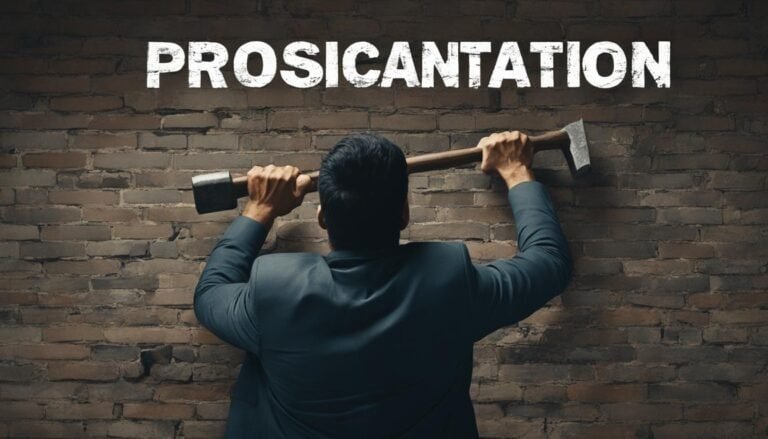Learned Helplessness: The Real Reason You’re Stuck (and how to get unstuck)
Do you ever feel like you’re stuck in a never-ending cycle of obstacles and challenges, unable to break free? This feeling of helplessness can be frustrating and can significantly impact various aspects of your life – relationships, career, and even your mental state. But what if I told you that this sense of being stuck is not permanent? There is a way to overcome it and regain control of your life.
Psychologist Martin Seligman introduced the concept of “learned helplessness.” This theory suggests that when we believe we have no control or choice in our circumstances, we become trapped in a state of helplessness. The good news is that just as helplessness is learned, it can also be unlearned. By implementing specific strategies and steps, you can break free from this cycle and build the mental resilience needed to overcome any obstacle.
Key Takeaways:
- Learned helplessness can significantly impact your personal and professional life.
- It is a learned behavior that can be overcome through conscious effort.
- Breaking free from learned helplessness requires building mental resilience.
- Developing a positive mindset is crucial in overcoming learned helplessness.
- Embracing personal growth and self-empowerment are key in breaking free from the limitations of helplessness.
Understanding the Effects of Learned Helplessness
Learned helplessness can have a profound negative impact on individuals’ psychological and emotional well-being. This phenomenon can result in feelings of powerlessness, helplessness, and depression, impeding personal growth and success. Individuals may find themselves trapped in situations they dislike, unable to break free from the shackles of learned helplessness. Moreover, this condition can also affect relationships as individuals struggle to assert themselves and make necessary changes.
Recognizing the psychological and emotional consequences of learned helplessness is crucial to charting a path towards overcoming it. By understanding the effects of this condition, individuals can take proactive steps to regain control of their lives and move towards a more empowered and fulfilling existence.
The Psychological Consequences of Learned Helplessness
The psychological consequences of learned helplessness are far-reaching. Individuals who experience this phenomenon often feel a sense of powerlessness, as if they have no control over their circumstances. This belief can lead to a loss of motivation and a lack of effort to improve one’s situation. Over time, it can erode self-esteem and self-confidence, making it even more difficult to break free from the cycle of helplessness.
Moreover, the negative impact of learned helplessness extends beyond the individual’s mindset. It can hinder problem-solving skills, affecting individuals’ ability to navigate challenges effectively. This can lead to increased anxiety and feelings of overwhelm, exacerbating the cycle of helplessness.
The Emotional Consequences of Learned Helplessness
The emotional consequences of learned helplessness can be equally distressing. Individuals may experience persistent feelings of frustration, sadness, and even despair. The belief that one’s efforts are futile can ignite a cycle of negative emotions, perpetuating the sense of helplessness.
Furthermore, learned helplessness can erode individuals’ sense of hope and optimism. The inability to envision a future where change is possible can lead to emotional stagnation and a lack of motivation to take action. Over time, these emotional consequences can contribute to symptoms of depression, impacting one’s overall well-being and quality of life.
It is important to address these psychological and emotional consequences of learned helplessness in order to embark on a journey of healing and growth. By understanding the effects of this condition, individuals can begin to break free from its grip and create a life filled with empowerment and resilience.
| Effects of Learned Helplessness | Consequences |
|---|---|
| Feelings of Powerlessness | Loss of control, lack of motivation |
| Helplessness | Low self-esteem, lack of self-confidence |
| Depression | Feelings of sadness, despair |
| Hindered Personal Growth | Lack of progress, inability to advance |
| Impact on Relationships | Difficulty asserting oneself, resistance to change |
Breaking Free from Learned Helplessness
Overcoming learned helplessness requires conscious effort and a proactive approach. There are several strategies and steps individuals can take to break free from learned helplessness. These include:
- Recognize your patterns: Take time to reflect on situations where you tend to feel helpless. Identify recurring patterns and triggers that contribute to this feeling.
- Challenge negative beliefs: Question the negative beliefs that reinforce your learned helplessness. Replace them with positive and empowering thoughts that promote self-belief and resilience.
- Set achievable goals: Break down larger goals into smaller, manageable steps. By setting achievable goals and celebrating your progress, you can build momentum and motivation.
- Take action: Start taking small actions towards change and progress. Even small steps can lead to a sense of accomplishment and build confidence in your ability to overcome obstacles.
- Seek support: Reach out to friends, family, or a therapist who can offer guidance and support. Surround yourself with a supportive network that believes in your ability to overcome challenges.
By implementing these strategies and steps, you can break free from learned helplessness and begin building mental resilience. Remember, overcoming obstacles is a journey, and progress may come gradually. Stay committed and persistent, and you’ll be on your way to reclaiming control over your life.
The Impact of Learned Helplessness on Mental Health
Learned helplessness can have a profound impact on mental health, leading to feelings of depression and anxiety. When individuals believe they have no control over their circumstances, they may feel trapped, powerless, and unable to change their situation.
Depression is a common consequence of learned helplessness. The constant perception of being stuck can contribute to a sense of hopelessness and despair. Individuals may feel overwhelmed by the challenges they face and experience a loss of motivation and interest in activities they once enjoyed. Depression can significantly impair daily functioning and quality of life.
Anxiety is another psychological consequence of learned helplessness. The lack of control and a belief that nothing can be done to improve the situation can lead to increased stress and worry. Individuals may constantly anticipate negative outcomes and struggle with excessive fear or unease. The perpetual state of anxiety can take a toll on mental well-being and overall functioning.
Coping with learned helplessness requires a comprehensive approach that addresses both the underlying psychological factors and the symptoms of depression and anxiety. Self-awareness plays a crucial role in recognizing the patterns of learned helplessness and identifying the areas of life where change is needed.
Self-care practices such as exercise, healthy eating, and regular sleep can help maintain overall mental well-being. Engaging in activities that bring joy and fulfillment, practicing relaxation techniques, and seeking social support are also beneficial in managing the impact of learned helplessness on mental health.
It is important to remember that seeking professional help from mental health professionals can provide the necessary guidance and support in coping with learned helplessness. Therapies such as cognitive-behavioral therapy (CBT) and positive psychology interventions can help individuals develop coping strategies, challenge negative beliefs, and regain a sense of control over their lives.
Managing the Impact of Learned Helplessness on Mental Health: Strategies
- Develop self-awareness to recognize learned helplessness patterns
- Practice self-care through exercise, healthy eating, and regular sleep
- Engage in activities that bring joy and fulfillment
- Utilize relaxation techniques to alleviate stress and anxiety
- Seek social support from friends, family, or support groups
- Consider professional help from mental health professionals
- Explore therapies such as cognitive-behavioral therapy (CBT) and positive psychology interventions
Testimonials
“Understanding the impact of learned helplessness on my mental health was a breakthrough moment for me. It helped me realize that I had the power to change my circumstances and regain control over my life.” – Emily
“Coping with learned helplessness has been challenging, but with the support of my therapist and the implementation of self-care practices, I have been able to manage my depression and anxiety more effectively.” – Daniel
| Mental Health Symptoms | Impact of Learned Helplessness |
|---|---|
| Depression | Feelings of hopelessness, lack of motivation, loss of interest in activities |
| Anxiety | Increased stress, excessive fear, constant anticipation of negative outcomes |
Building Resilience to Overcome Learned Helplessness
Building resilience is a fundamental step towards overcoming learned helplessness and gaining the ability to conquer obstacles. Resilience encompasses the capacity to bounce back from challenges and setbacks, as well as the power to adapt and grow amidst adversity. To build resilience, you can focus on developing mental strength, cultivating a positive mindset, and embracing opportunities for personal growth. By practicing self-care, seeking support, setting realistic goals, and maintaining a sense of optimism and hope, you can strengthen your resilience and break free from the limitations of learned helplessness.
The Role of Self-Empowerment in Overcoming Learned Helplessness
Self-empowerment plays a crucial role in overcoming learned helplessness. It involves recognizing and embracing your own abilities, strengths, and capacity for change. By developing an empowering mindset and believing in yourself, you can take control of your life and break free from the limitations of learned helplessness.
Self-empowerment starts with self-belief. When you believe in your capabilities and potential, you create a strong foundation for growth and progress. It’s about understanding that you have the power to shape your own path and make choices that align with your values and goals.
One important aspect of self-empowerment is setting boundaries. By defining your limits and communicating them assertively, you establish a sense of control over your circumstances. This allows you to focus on what truly matters to you and avoid situations that drain your energy or hinder your progress.
Advocating for yourself is another essential aspect of self-empowerment. It means speaking up for your needs, desires, and rights. By expressing your thoughts and feelings, you ensure that your voice is heard and respected. It’s about taking an active role in shaping the outcomes of your life.
When practicing self-empowerment, it’s important to make choices that align with your values and goals. This involves reflecting on what is truly important to you and making decisions based on your own principles. It’s about taking ownership of your life and making conscious choices that lead to personal fulfillment and growth.
Remember, self-empowerment is a process that requires effort and commitment. It’s about cultivating an empowering mindset and taking proactive steps to take control of your life. By embracing self-empowerment, you can overcome learned helplessness and create a life filled with resilience, growth, and fulfillment.
Strategies for Self-Empowerment
| Strategy | Description |
|---|---|
| Believe in Yourself | Recognize your abilities and potential for growth. |
| Set Boundaries | Define your limits and assertively communicate them. |
| Advocate for Yourself | Speak up for your needs, desires, and rights. |
| Make Aligned Choices | Reflect on your values and goals to make decisions that align with them. |
The Importance of a Positive Mindset in Overcoming Learned Helplessness
Cultivating a positive mindset is essential in overcoming learned helplessness. A positive mindset enables you to view challenges as opportunities for growth and approach setbacks with resilience and optimism. By reframing negative thoughts and practicing mindset shifts, you can change your perspective and develop a more optimistic and empowering outlook. This can help build resilience and foster a sense of control over your circumstances.
| Benefits of a Positive Mindset | |
|---|---|
| 1. Increased Resilience | |
| 2. Improved Problem-Solving Skills | |
| 3. Enhanced Emotional Well-being | |
| 4. Heightened Self-Confidence | |
| 5. Better Relationship Building |
A positive mindset has numerous benefits that can support you in overcoming learned helplessness and navigating life’s challenges. Here are some key advantages:
- Increased Resilience: A positive mindset helps you bounce back from setbacks and persevere in the face of obstacles. It enables you to maintain a sense of optimism and find solutions even in difficult situations.
- Improved Problem-Solving Skills: A positive mindset encourages creative thinking and expands your ability to generate innovative solutions. It allows you to see beyond limitations and explore new approaches to overcoming obstacles.
- Enhanced Emotional Well-being: Cultivating a positive mindset promotes emotional well-being by reducing stress, anxiety, and depression. It fosters a greater sense of happiness, satisfaction, and overall mental wellness.
- Heightened Self-Confidence: A positive mindset empowers you to believe in your capabilities and strengths. It boosts self-esteem and self-efficacy, enabling you to take on challenges with confidence.
- Better Relationship Building: A positive mindset enhances your interactions with others. It promotes empathy, understanding, and effective communication, leading to stronger and more fulfilling relationships.
By embracing a positive mindset, you can transform learned helplessness into an opportunity for personal growth and empowerment. Reframing negative thoughts and adopting an optimistic outlook will empower you to take control of your life and overcome obstacles with resilience and determination.
Unlock the Power of Positive Affirmations
Positive affirmations are powerful tools that can reinforce a positive mindset and help overcome learned helplessness. By regularly affirming your strengths, capabilities, and potential for growth, you can rewire your brain to focus on positivity and possibility.
“I am capable of overcoming any challenge that comes my way. I embrace setbacks as opportunities for growth and approach them with resilience and optimism.”
Take a moment each day to repeat affirmations that resonate with you. Write them down, say them out loud, and believe in their truth. The more you reinforce positive thoughts and beliefs, the stronger your positive mindset will become.
Overcoming Obstacles and Embracing Personal Growth
Overcoming learned helplessness involves embracing obstacles as opportunities for personal growth. Instead of viewing challenges as roadblocks, you can see them as chances to learn, develop new skills, and become stronger. By embracing change and committing to self-improvement, you can break free from the limitations of learned helplessness and create a more fulfilling and empowered life.
When faced with obstacles, it’s crucial to adopt a growth mindset. This means believing that you have the power to overcome challenges and that they are stepping stones toward personal growth. Embracing change can be intimidating, but it’s through change that you can discover new opportunities and strengths. Rather than being held back by fear or uncertainty, you can choose to embrace change and see it as a catalyst for personal transformation.
“The only way to grow is to step out of your comfort zone and face the unknown. Embrace challenges, for they are the key to unlocking your true potential.”
Self-improvement is a lifelong journey that involves continuous learning and development. By investing time and effort into personal growth, you can expand your knowledge, skills, and capabilities. This can open doors to new opportunities and empower you to overcome obstacles with confidence.
To illustrate the importance of overcoming obstacles and embracing personal growth, here is an example:
| Obstacle | Embracing Personal Growth |
|---|---|
| Failed business venture | Reflect on lessons learned, acquire new entrepreneurial skills, and start a new venture with a stronger foundation. |
| Difficult personal relationship | Seek professional help or therapy, develop communication and emotional intelligence skills, and foster healthier relationships in the future. |
| Career setback | Take time to reassess career goals, acquire new skills or qualifications, and pursue opportunities that align with personal passions and strengths. |
These examples demonstrate that through embracing personal growth, individuals can turn obstacles into opportunities for positive change and self-improvement. By viewing challenges as stepping stones rather than barriers, you can unlock your full potential and create a life filled with resilience, accomplishment, and fulfillment.
Strategies for Psychological Empowerment
Psychological empowerment is a crucial step in overcoming learned helplessness and regaining control over your life. By implementing specific strategies, you can build confidence, challenge limiting beliefs, and make transformative mindset shifts. These approaches will help you cultivate a sense of agency and reclaim your power. Here are some effective strategies for psychological empowerment:
Build Confidence
Building confidence is essential for psychological empowerment. It involves recognizing your strengths, celebrating your achievements, and pushing yourself outside of your comfort zone. By taking small steps and gradually building up your confidence, you’ll develop a belief in your abilities and increase your self-assurance.
Set Goals
Setting goals provides direction and purpose, enabling you to take proactive steps towards personal growth and empowerment. When setting goals, make sure they are specific, measurable, achievable, relevant, and time-bound (SMART goals). These clear objectives will give you a sense of focus and motivation as you work towards reclaiming control over your life.
Practice Self-Compassion
Self-compassion involves treating yourself with kindness, understanding, and acceptance, especially during challenging times. Embrace self-care practices, such as mindfulness, meditation, and self-reflection. Develop self-compassionate inner dialogue and replace self-criticism with self-encouragement. By practicing self-compassion, you’ll cultivate a nurturing environment for personal growth and empowerment.
Challenge Limiting Beliefs
Identify and challenge limiting beliefs that contribute to learned helplessness. Recognize that these beliefs are often irrational and unfounded. Replace them with empowering beliefs that support your personal growth, resilience, and ability to overcome obstacles. Surround yourself with positive affirmations and reminders of your strengths, capabilities, and potential for change.
Remember, the way you think and perceive your circumstances has a profound impact on your ability to reclaim control and empower yourself.
By implementing these strategies, you’ll be on your way to psychological empowerment and reclaiming control over your life. Remember, it is a journey that requires commitment, perseverance, and self-reflection. Embrace these strategies and take proactive steps towards building confidence, challenging limiting beliefs, and making mindset shifts. Through psychological empowerment, you have the power to transform your life and overcome learned helplessness.
Navigating Setbacks and Maintaining Resilience
In the journey of overcoming learned helplessness, the ability to navigate setbacks and maintain resilience is crucial. Life is full of challenges and obstacles, but it’s your response to them that determines your path forward. To overcome setbacks and keep moving forward, consider these strategies:
- Practice Self-Reflection: Take the time to reflect on setbacks and setbacks and learn from them. Explore what went wrong, what could have been done differently, and how you can apply these lessons to future situations.
- Seek Support: Don’t be afraid to lean on others when facing setbacks. Reach out to trusted friends, family, or mentors who can offer guidance, encouragement, and valuable perspectives.
- Stay Connected to a Supportive Network: Surround yourself with a network of people who believe in you and your abilities. Their support and positive influence can help you stay motivated and strengthen your resilience.
- Practice Self-Care: Set aside time to take care of yourself physically, mentally, and emotionally. Engage in activities that bring you joy, relaxation, and peace of mind. Taking care of yourself enables you to approach setbacks with a clear and resilient mindset.
Bouncing back from failure requires inner strength and determination. It’s important to remember that setbacks are part of life, and they provide opportunities for growth and learning. By navigating setbacks and maintaining resilience, you can overcome challenges and continue on your path towards personal empowerment and fulfillment.
A moment of reflection amidst setbacks can provide clarity and resilience.
Conclusion
Overcoming learned helplessness is within your reach. By dedicating yourself to self-awareness and taking proactive steps, you can regain control of your life and cultivate personal empowerment and growth. Understanding the impact of learned helplessness is crucial. Acknowledging that setbacks may occur along the journey, it’s important to stay determined and committed to your own empowerment.
By adopting strategies that break free from the limitations of learned helplessness, you can build resilience and embrace personal growth. Remember, it’s a journey, and setbacks are to be expected. But with determination and a positive mindset, you can create a life filled with resilience, growth, and fulfillment.
Take the first step towards taking control of your life and overcoming learned helplessness. Embrace the power within you and commit to the journey of personal empowerment and growth. You have the ability to break free and create the life you desire, filled with purpose and self-belief.






